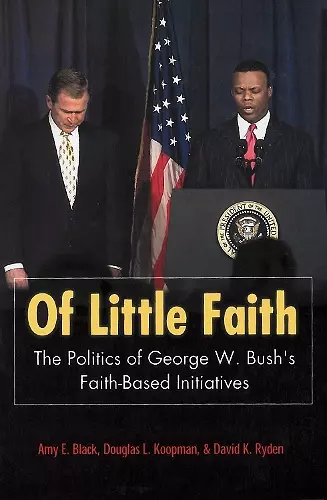Of Little Faith
The Politics of George W. Bush's Faith-Based Initiatives
Format:Paperback
Publisher:Georgetown University Press
Published:21st Apr '04
Currently unavailable, and unfortunately no date known when it will be back

Should faith-based organizations be permitted by law to compete to administer government programs on the same basis as all other non-profit organizations? This lively, lucid, and timely book chronicles how, during the first year of the Bush faith initiative, a seemingly deep and growing consensus favoring public support for community-serving sacred places that serve civic purposes was succeeded by battles between religious 'purists' and 'pragmatists,' and led to legislative politics that were far from bipartisan. Both as a fellow political scientist and as an actor in the drama, I heartily applaud the authors for their tough-minded but balanced, critical yet constructive, analysis and conclusions. -- John J. DiIulio Jr., professor of political science, University of Pennsylvania, and former director, White House Office of Faith-Based and Community Initiatives
Drawing on interviews with key figures in Washington, this title reveals the evolution of George W Bush faith-based strategy since his campaign for the presidency through congressional votes. It shows how political rhetoric, infighting, and poor communication shipwrecked Bush's efforts to alter the way government might conduct social services.George W. Bush had planned to swear his oath of office with his hand on the Masonic Bible used by both his father and George Washington, however, due to the inclement weather, a family Bible was substituted. Almost immediately on taking office, President Bush made passage of "faith-based initiatives" - the government funding of religious charitable groups - a legislative priority. However, "inclement" weather storm-tossed his hopes for faith-based initiatives as well. What happened? Why did these initiatives, which began with such vigor and support from a popular president, fail? And what does this say about the future role of religious faith in American public life? Amy Black, Douglas Koopman, and David Ryden - all prominent political scientists - utilize a framework that takes the issue through all three branches of government and analyzes it through three very specific lenses: a public policy lens, a political party lens, and a lens of religion in the public square. Drawing on dozens of interviews with key figures in Washington, the authors tell a compelling story, revealing the evolution of the Bush faith-based strategy from his campaign for the presidency through congressional votes to the present. They show how political rhetoric, infighting, and poor communication shipwrecked Bush's efforts to fundamentally alter the way government might conduct social services. The authors demonstrate the lessons learned, and propose a more fruitful, effective way to go about such initiatives in the future.
"Should faith-based organizations be permitted by law to compete to administer government programs on the same basis as all other nonprofit organizations? This lively, lucid, and timely book chronicles how, during the first year of the Bush faith initiative, a seemingly deep and growing consensus favoring public support for community-serving sacred places that serve civic purposes was succeeded by battles between religious 'purists' and 'pragmatists,' and led to legislative politics that were far from bipartisan. Both as a fellow political scientist and as an actor in the drama, I heartily applaud the authors for their tough-minded but balanced, critical yet constructive analysis and conclusions." - John J. Dilulio, Jr., professor of political science, University of Pennsylvania, and former director, White House Office of Faith-Based and Community Initiatives"
ISBN: 9781589010130
Dimensions: unknown
Weight: 499g
368 pages